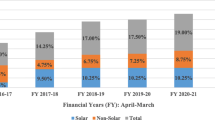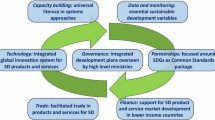Abstract
As the societal benefits associated with transitioning to more sustainable, less fossil fuel-reliant energy systems are increasingly recognized by communities throughout the world, the potential of creating ‘green jobs’ within a ‘green economy’ is attracting much attention. Green energy clusters are increasingly promoted throughout the world as a strategy to simultaneously promote economic vitality and stimulate a sustainable energy transition. In spite of their emerging role in regional-scale sustainability planning efforts, such initiatives have not been considered within the sustainability transitions literature. This paper explores the development of one such regional sustainable energy cluster initiative in Central Massachusetts in Northeastern USA to consider the potential for such cluster initiatives to contribute to socio-technical transition in the energy system. Since 2008, a diverse set of stakeholders in Central Massachusetts, including politicians, universities, businesses, local citizens, and activists, have been working toward facilitating the emergence of an integrated cluster of activity focused on sustainable energy. Through interviews with key actors, participant observation, and document review, this research assesses the potential of this cluster initiative to contribute to a regional socio-technical transition. The empirical details of this case demonstrate that sustainable energy cluster initiatives can potentially accelerate change in entrenched energy regimes by promoting institutional thickness, generating regional ‘buzz’ around sustainable energy activities, and building trust between multiple and diverse stakeholders in the region. This research also contributes to emerging efforts to better ground socio-technical transitions in geographic space.
Similar content being viewed by others
References
Amin A (1999) An institutionalist perspective on regional economic development. Int J Urban Reg Res 23(2):365–378
Amin A, Thrift N (1995) Institutional issues for the European regions: from markets and plans to socioeconomics and powers of association. Econ Soc 24(1):41–66
Arikan A (2009) Interfirm knowledge exchanges and the knowledge creation capability of clusters. Acad Manag Rev 34:658–676
Bathelt H, Malmberg A, Maskell P (2004) Clusters and knowledge: local buzz, global pipelines and the process of knowledge creation. Prog Hum Geogr 28(1):31–56
Baxter C, Tyler P, Moore B, Morrison N, McGaffin R, Otero-Garcia M (2005) Enterprising places: sustaining competitive locations for technology-based activity. Programme on Regional Innovation. Cambridge-MIT Institute, Cambridge
Bramwell A, Wolfe DA (2008) Universities and regional economic development: the entrepreneurial University of Waterloo. Res Policy 37(8):1175–1187
Brown LR (2011) World on the edge: how to prevent environmental and economic collapse. W.W. Norton & Company, New York
Brown HS, Vergragt PJ, Green K, Berchicci L (2004) Bounded socio-technical experiments (BSTEs): higher order learning for transitions towards sustainable mobility. In: Elzen B, Geels FW, Green K (eds) System innovation and the transition to sustainability: theory, evidence and policy. Edward Elgar, Cheltenham, pp 191–222
Brown HS, Vergragt PJ (2008) Bounded socio-technical experiments as agents as systemic change: the case of a zero-energy residential building. Technol Forecast Soc Chang 75(1):107–130
Casper S (2007) How do technology clusters emerge and become sustainable? Social network formation and inter-firm mobility within the San Diego biotechnology cluster. Res Policy 36(4):438–455
City of Worcester (2004) Utilizing Worcester’s colleges and universities to promote economic development and expansion of the tax base. Worcester, MA
City of Worcester (2010) City of Worcester Designated a Green Community. Worcester, MA Press Release. http://www.worcesterma.gov/announcements/city-of-worcester-designated-a-green-community
Clean Edge, Inc. (2010) A future of innovation and growth: advancing Massachusetts’ clean-energy leadership
Coenen L, Raven R, Verbong G (2010) Local niche experimentation in energy transitions: a theoretical and empirical exploration of proximity advantages and disadvantages. Technol Soc 32:295–302
Cooke P (2001) Regional innovation systems, clusters, and the knowledge economy. Ind Corp Change 10(4):945–974
Cooke P (2002) Regional innovation systems: general findings and some new evidence from biotechnology clusters. J Technol Transf 27(1):133–145
D’Amico G (2007) Clean energy: a second cluster for Worcester. Worcester, MA
DeCarolis JF, Goble RL, Hohenemser C (2000) Searching for energy efficiency on campus: Clark University’s 30-year quest. Environment 42(4):8–20
Deutz P, Gibbs D (2008) Industrial ecology and regional development: eco-industrial development as cluster policy. Reg Stud 42(10):1313–1328
Dupuy C, Torre A (2006) Local clusters, trust, confidence and proximity. In: Pitelis CN, Sugden R, Wilson JR (eds) Clusters and globalisation: the development of urban and regional economies. Edward Elgar, Cheltenham, pp 175–195
Elzen B, Wieczorek A (2005) Transitions towards sustainability through system innovation. Technol Forecast Soc Chang 72:651–661
Engleman R (2009) Earth 3.0: population and sustainability. Scientific American, June 2009
Gallagher KS, Holdren JP, Sagar AD (2006) Energy-technology innovation. Annu Rev Environ Resour 31:193–237
Geels FW (2001) Technological transitions as evolutionary reconfiguration processes: a multi-level perspective and a case-study. Paper presented at the Nelson and Winter Conference, Aalborg, Denmark, Danish Research Unit for Industrial Dynamics (DRUID), June 2001
Geels FW (2002) Technological transitions as evolutionary reconfiguration processes: a multi-level perspective and a case-study. Res Policy 31:1257–1274
Geels FW (2005a) The dynamics of transitions in socio-technical systems: a multi-level analysis of the transition pathway from horse-drawn carriages to automobiles (1860–1930). Tech Anal Strat Manag 17(4):445–476
Geels FW (2005b) Processes and patterns in transitions and system innovations: refining the co-evolutionary multi-level perspective. Technol Forecast Soc Chang 72(6):681–696
Geels FW (2010) Ontologies, socio-technical transitions (to sustainability), and the multi-level perspective. Res Policy 39:495–510
Genus A, Coles A-M (2008) Rethinking the multi-level perspective of technological transitions. Res Policy 37(9):1436–1445
Grabher G (2002) Cool projects, boring institutions: temporary collaboration in social context. Reg Stud 36(3):205–214
Harrison B, Kluver J (1989) Reassessing the ‘Massachusetts miracle’: reindustrialization and balanced growth, or convergence to ‘Manhattanization’? Environ Plan A 21:771–801
Hodson M, Marvin S (2010) Can cities shape socio-technical transitions and how would we know if they were? Res Policy 39(4):477–485
Insitute for Energy and Sustainability (IES) (2010) 2010 Interim report “Focusing on jobs, energy and science”. IES, Worcester
Insitute for Energy and Sustainability (IES) (2011) IES’ 2011 strategic plan: jobs, energy and science. IES, Worcester
Jiusto S, McCauley S (2010) Assessing sustainability transition in the US electrical power system. Sustainability 2:551–575
Jones V (2008) The green collar economy: how one solution can fix our two biggest problems. Harper Collins, New York
KanEnergi (2007) Green energy clusters. Stimulation of renewable energy markets through the establishment of regional clusters. KanEnergi Sweden AB. http://www.kanenergi.se/res/publikationer/greenenergyclusterbookletfinal.pdf
Kennedy E (2009) Green tech cluster chats up Murray, McGovern. Worcester Business Journal, Worcester
Krugman PR (1995) Innovation and agglomeration: two parables suggested by city-size distributions. Jpn World Econ 7:371–390
Loorbach D (2007) Transition management: new mode of governance for sustainable development. International Books, Utrecht
Loorbach D, Rotmans J (2006) Managing transitions for sustainable development. In: Wieczorek AJ, Olsthoorn X (eds) Understanding industrial transformation. Springer, New York
Marshall A (1920) Principles of economics. MacMillan, London
Martin R, Sunley P (2003) Deconstructing clusters: chaotic concept or policy panacea? J Econ Geogr 3(1):5–35
Milford L, Muro M, Morey J, Saha D, Sinclair M (2012) Leveraging state clean energy funds for economic development. Brookings-Rockerfeller, Project on State and Metropolitan Innovation
Normile D (2008) China’s living laboratory in urbanization. Science 319(5864):740–743
Porter ME (2000) Location, competition, and economic development: local clusters in a global economy. Econ Develop Q 14(1):15–34
Porter ME, Kwek J-H, O’Neil C, Satchcroft A, Vogt T (2008) The Australian renewable energy cluster. Microeconomics of competitiveness. Harvard Business School. http://www.isc.hbs.edu/pdf/Student_Projects/Australian_Renewable_Energy_2008.pdf
Rip A, Kemp R (1998) Technological change. In: Raynor S, Malone L (eds) Human choice and climate change: resources and technology. Battelle Press, Columbus, pp 327–399
Rotmans JR, Kemp A, van Asselt M (2001) More evolution than revolution: transition management in public policy. Foresight J Future Stud Strateg Think Policy 3(1):15–31
Saxenian A (1994) Regional advantage: culture and competition in Silicon Valley and Route 128. Harvard University Press, Cambridge
Smith A (2006a) Governance lessons from green niches: the case of eco-housing. In: Murphy J (ed) Framing the present, shaping the future: contemporary governance of sustainable technologies. Earthscan, London, pp 89–109
Smith A (2006b) Green niches in sustainable development: the case of organic food in the United Kingdom. Environ Plan C Gov Policy 24:439–458
Smith A, Stirling A, Berkhout F (2005) The governance of sustainable socio-technical transitions. Res Policy 34(10):1491–1510
Smith A, Voß J-P, Grin J (2010) Innovation studies and sustainability transitions: the allure of the multi-level perspective and its challenges. Res Policy 39:435–448
Späth P, Rohracher H (2010) “Energy regions”: the transformative power of regional discourses on socio-technical futures. Res Policy 39:449–458
Stephens JC, Graham AC (2010) Toward an empirical research agenda for sustainability in higher education: exploring the transition management framework. J Clean Prod 18:611–618
Stephens JC, Hernandez ME, Román M, Graham AC, Scholz RW (2008) Higher education as a change agent for sustainability in different cultures and contexts. Int J Sustain High Educ 9(3):317–338
Storper M (1997) The regional world: territorial development in a global economy. Guilford Press, New York
Truffer B (2008) Society, technology, and region: contributions from the social study of technology to economic geography. Environ Plan A 40:966–985
Truffer B, Coenen L (2012) Environmental innovation and sustainability transitions in regional studies. Reg Stud 46(1):1–21
Vaitheeswaran VV (2003) Power to the people: how the coming energy revolution will transform an industry, change our lives, and maybe even save the planet. Farrar, Straus and Giroux, New York
van der Brugge R, Rotmans J, Loorbach D (2005) The transition in Dutch water management. Reg Environ Change 5:164–176
Verbong G, Geels F (2007) The ongoing energy transition: lessons from a socio-technical, multi-level analysis of the Dutch electricity system (1960–2004). Energy Policy 35(2):1025–1037
Vergragt PJ, Brown HS (2010) Managing urban transitions: visioning and stakeholder collaboration. A case study in transforming residential housing in Worcester, MA. George Perkins Marsh Institute, Working Paper No 2010-10. Clark University, Worcester, MA. http://www.clarku.edu/departments/marsh/news/WP2010-10.pdf
Vincente J, Suire R (2007) Informational cascades versus network externalities in locational choice: evidence of ‘ICT clusters’ formation and stability. Reg Stud 41(2):173–184
Worcester Municipal Research Bureau, Inc. (2008) Benchmarking economic development in Worcester: 2008. Worcester Municipal Research Bureau, Inc., Worcester
Yamamura E (2009) Dynamics of social trust and human capital in the learning process: the case of the Japanese garment cluster in the period 1968–2005. J Econ Behav Organ 72(1):377–389
Acknowledgments
The authors thank the Mosakowski Institute for Public Enterprise at Clark University for the financial support for this research. In addition, research collaborators Mary-Ellen Boyle, Jing Zhang, Lisa Kwiatkowski, Angela Marshall, and Hila Benzaken are gratefully acknowledged for their perspective and contributions to this work. Thanks also go to all of the actors that gave their time to be interviewed and all of our university and community partners.
Author information
Authors and Affiliations
Corresponding author
Additional information
Handled by Frans Berkhout, Vrije Universiteit, The Netherlands.
Rights and permissions
About this article
Cite this article
McCauley, S.M., Stephens, J.C. Green energy clusters and socio-technical transitions: analysis of a sustainable energy cluster for regional economic development in Central Massachusetts, USA. Sustain Sci 7, 213–225 (2012). https://doi.org/10.1007/s11625-012-0164-6
Received:
Accepted:
Published:
Issue Date:
DOI: https://doi.org/10.1007/s11625-012-0164-6




